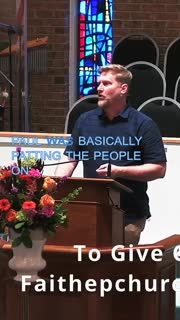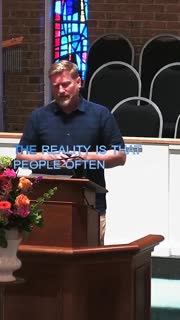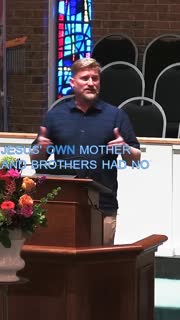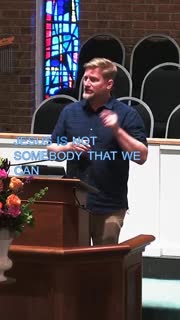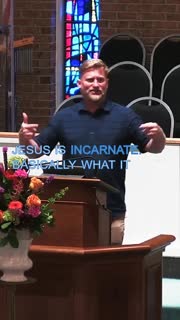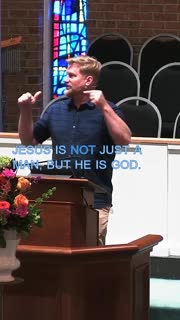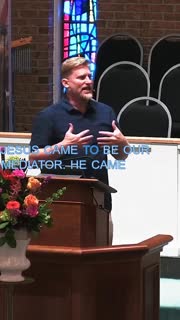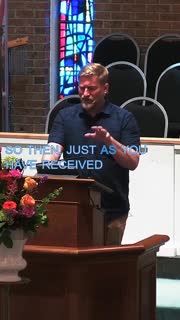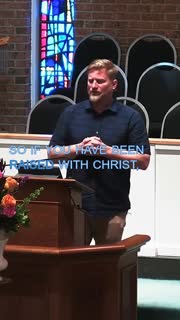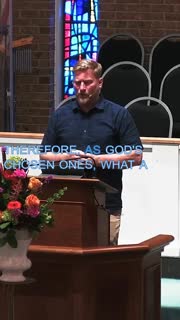Understanding the Dual Nature of Jesus Christ
Devotional
Sermon Summary
Bible Study Guide
Sermon Clips
1. "Paul was basically patting the people on the back of Thessalonica for their willingness to share in the mission of the gospel. We just heard about being financially promiscuous. You know, when it comes to offering at the church that I grew up in, my pastor would say something like this. He would say, okay, tell me. Take out your wallets, pass it to the person next to you, and give like you've always wanted to give. I'm not going to ask you to be that promiscuous. But know that when you give, that there is a blessing that comes with it. That's what Paul's saying. He's saying, you know what, blessing, there's a blessing. And it may not be a financial blessing, but it might be a blessing knowing that you are sowing into the kingdom of God. And his mission is being accomplished. So when we give, we're sowing into the kingdom. And God blesses his people for that." [44:25] (48 seconds)
2. "The reality is that people often struggle with who Jesus is. They've struggled with it for thousands of years. The disciples early on in the ministry of Jesus, they struggled to understand who Jesus was. They thought that he was the Messiah. And when they had an idea of the Messiah, what they were thinking of was somebody that would come and deliver them from the oppressors that were oppressing the land of Israel. And so for them at this time, it was the people of Rome, the Roman Empire. In their mind, Jesus was the Messiah coming to deliver them from the rule of the Roman Empire. They were always looking for somebody to come to deliver them from their physical oppressors. But what we know about Jesus when we dig into his word, what we've come to understand is that when Jesus is saying that he has come to set the captive free, that he has come to deliver the oppressed, what he was talking about, he was talking about those who were oppressed by sin, those who were captive to sin." [53:08] (60 seconds)
3. "Jesus' own mother and brothers had no idea who he was. They didn't even really like Jesus because he always talked about who he was. They did later on in the ministry, but early on they really had questions about Jesus. But even after the life of Jesus, people have had questions about who Jesus might be for hundreds and thousands of years. And there's been a lot of different interpretations of who Jesus might be. Some thought that Jesus was just merely a man, that he was just somebody who came, who had really good moral teachings. We can learn some really good things about Jesus. We can learn how to be kind to one another and love one another, and those were great moral things. But they may not have thought Jesus to be necessarily anything more than a man." [54:06] (46 seconds)
4. "Jesus is not somebody that we can redefine or that we can project onto, that we can take our own ideas about. What we need to do is, going back to last week, God has given us the scriptures that very plainly map out who Jesus is. Now, not simple. There's complexity in who Jesus is. But the Bible is clear about who Jesus is and how he is constituted. And so it's important for us to be able to define who he was, also understanding that he is eternal truth and he's unchanging, even since the foundations of the world." [57:33] (35 seconds)
5. "Jesus is incarnate. Basically what it is, it's a, Jesus is, God has presented himself in a physical form. When we say incarnate, that's what we mean. God is presented in a physical form. Jesus, when he came to this earth, he had skin, he had flesh, he had bones, he had a head, he had a brain, he had a heart. He had all of the same physical makeup that we have. There was no distinction between us and our makeup and Jesus and his makeup. So when we talk about the incarnate Jesus, that's what we're talking about, the incarnate God. We're talking about the physical aspect, the physical aspect of who Jesus is, the physical makeup of Jesus." [58:51] (45 seconds)
6. "Jesus is not just a man, but he is God. I love what it continues to say. Colossians 1, 18 through 20 talks about his relationship to the church. It says that he is also the head of the body. He's the head of the church. He is the beginning, the firstborn from the dead, so that he might come to have first place in everything. Catch that. He is supposed to be the firstborn to have first place in everything. And what that means is that Jesus, his intention was that when we come to an understanding of who he is, and we place our faith in him, and we find our salvation through Christ, and we find our eternal hope that one day we will be in a glorified body and in the eternal existence with God, what Jesus wants us to understand is when we get to that place, now he is first place in everything. He expects us to put him in first place." [01:03:27] (63 seconds)
7. "Jesus came to be our mediator. He came to step into our place. He came in to pay our debt. You see, as sinners, we carry a debt that we cannot pay off. There is no way that we can pay the debt that's required to stand in front of a holy God. And so Jesus as our mediator, as our redeemer has come and said, you know what? You can't pay that price, so I will pay that price on your behalf. And the beautiful thing is that when he pays your debt and you are free from the debt that you owe, Scripture tells us that when the Son sets us free, he is free indeed." [01:07:10] (40 seconds)
8. "So then, just as you have received Christ Jesus as Lord, continue to walk in him. This is great stuff. Being rooted and built up in him and established in the faith. In other words, there's a picture there of a tree that gets rooted and it grows. It grows deep and it grows up. And so Jesus is doing that. He is establishing us. It's not the things that we do, right? We've been saved because of our faith, but once we've accepted Christ into our life, now he is building deep roots through his Holy Spirit, and he's building us up so that we can flourish as beautiful members of the family of God. So being rooted and built up in him and established in the faith, just as you were taught, and overflowing with gratitude, just as you were taught." [01:09:02] (50 seconds)
9. "So if you have been raised with Christ, seek the things above. That's what we do. That's how we connect. We begin to seek the things above, where Christ is seated at the right hand of God. Set your mind on the things above, not on earthly things. And so when we set our mind on the things above, what are we doing? We are, first of all, he points us right to where we need to go. First of all, we need to understand that Jesus is on the throne, that he is ruling and reigning in our hearts today. And so we look to that and understand that. And when we have Jesus reigning and ruling in our hearts, it really doesn't matter what's going on in the world around us, because he is establishing us, and he is giving us the things that he's called us to, and he's also given us things like purpose and hope, and he's building us up and he's growing us." [01:11:01] (52 seconds)
10. "Therefore, as God's chosen ones, what a beautiful thing. We who are here today, we who are followers of Christ, we who have, uh, given our life to Jesus and said that we do believe that you are the Messiah, and we make you Lord of our life, you are the chosen ones, and you are holy and dearly loved. This is what he tells us to do. Put on compassion. Put on kindness. Put on humility. Put on gentleness. Put on patience. Bear one another's burdens. Forgive one another. Love one another. If anyone has a, has a grievance against another, forgive them. Just as the Lord has forgiven you, so you also are forgiven. And you forgive. And above all, put on love, which is the perfect bond of unity. When we come to an understanding of who Jesus is, he calls us to things, regardless of the good or the bad. He calls us to put on his character. He calls us to put on him." [01:15:08] (63 seconds)
Ask a question about this sermon
2. "The reality is that people often struggle with who Jesus is. They've struggled with it for thousands of years. The disciples early on in the ministry of Jesus, they struggled to understand who Jesus was. They thought that he was the Messiah. And when they had an idea of the Messiah, what they were thinking of was somebody that would come and deliver them from the oppressors that were oppressing the land of Israel. And so for them at this time, it was the people of Rome, the Roman Empire. In their mind, Jesus was the Messiah coming to deliver them from the rule of the Roman Empire. They were always looking for somebody to come to deliver them from their physical oppressors. But what we know about Jesus when we dig into his word, what we've come to understand is that when Jesus is saying that he has come to set the captive free, that he has come to deliver the oppressed, what he was talking about, he was talking about those who were oppressed by sin, those who were captive to sin." [53:08] (60 seconds)
3. "Jesus' own mother and brothers had no idea who he was. They didn't even really like Jesus because he always talked about who he was. They did later on in the ministry, but early on they really had questions about Jesus. But even after the life of Jesus, people have had questions about who Jesus might be for hundreds and thousands of years. And there's been a lot of different interpretations of who Jesus might be. Some thought that Jesus was just merely a man, that he was just somebody who came, who had really good moral teachings. We can learn some really good things about Jesus. We can learn how to be kind to one another and love one another, and those were great moral things. But they may not have thought Jesus to be necessarily anything more than a man." [54:06] (46 seconds)
4. "Jesus is not somebody that we can redefine or that we can project onto, that we can take our own ideas about. What we need to do is, going back to last week, God has given us the scriptures that very plainly map out who Jesus is. Now, not simple. There's complexity in who Jesus is. But the Bible is clear about who Jesus is and how he is constituted. And so it's important for us to be able to define who he was, also understanding that he is eternal truth and he's unchanging, even since the foundations of the world." [57:33] (35 seconds)
5. "Jesus is incarnate. Basically what it is, it's a, Jesus is, God has presented himself in a physical form. When we say incarnate, that's what we mean. God is presented in a physical form. Jesus, when he came to this earth, he had skin, he had flesh, he had bones, he had a head, he had a brain, he had a heart. He had all of the same physical makeup that we have. There was no distinction between us and our makeup and Jesus and his makeup. So when we talk about the incarnate Jesus, that's what we're talking about, the incarnate God. We're talking about the physical aspect, the physical aspect of who Jesus is, the physical makeup of Jesus." [58:51] (45 seconds)
6. "Jesus is not just a man, but he is God. I love what it continues to say. Colossians 1, 18 through 20 talks about his relationship to the church. It says that he is also the head of the body. He's the head of the church. He is the beginning, the firstborn from the dead, so that he might come to have first place in everything. Catch that. He is supposed to be the firstborn to have first place in everything. And what that means is that Jesus, his intention was that when we come to an understanding of who he is, and we place our faith in him, and we find our salvation through Christ, and we find our eternal hope that one day we will be in a glorified body and in the eternal existence with God, what Jesus wants us to understand is when we get to that place, now he is first place in everything. He expects us to put him in first place." [01:03:27] (63 seconds)
7. "Jesus came to be our mediator. He came to step into our place. He came in to pay our debt. You see, as sinners, we carry a debt that we cannot pay off. There is no way that we can pay the debt that's required to stand in front of a holy God. And so Jesus as our mediator, as our redeemer has come and said, you know what? You can't pay that price, so I will pay that price on your behalf. And the beautiful thing is that when he pays your debt and you are free from the debt that you owe, Scripture tells us that when the Son sets us free, he is free indeed." [01:07:10] (40 seconds)
8. "So then, just as you have received Christ Jesus as Lord, continue to walk in him. This is great stuff. Being rooted and built up in him and established in the faith. In other words, there's a picture there of a tree that gets rooted and it grows. It grows deep and it grows up. And so Jesus is doing that. He is establishing us. It's not the things that we do, right? We've been saved because of our faith, but once we've accepted Christ into our life, now he is building deep roots through his Holy Spirit, and he's building us up so that we can flourish as beautiful members of the family of God. So being rooted and built up in him and established in the faith, just as you were taught, and overflowing with gratitude, just as you were taught." [01:09:02] (50 seconds)
9. "So if you have been raised with Christ, seek the things above. That's what we do. That's how we connect. We begin to seek the things above, where Christ is seated at the right hand of God. Set your mind on the things above, not on earthly things. And so when we set our mind on the things above, what are we doing? We are, first of all, he points us right to where we need to go. First of all, we need to understand that Jesus is on the throne, that he is ruling and reigning in our hearts today. And so we look to that and understand that. And when we have Jesus reigning and ruling in our hearts, it really doesn't matter what's going on in the world around us, because he is establishing us, and he is giving us the things that he's called us to, and he's also given us things like purpose and hope, and he's building us up and he's growing us." [01:11:01] (52 seconds)
10. "Therefore, as God's chosen ones, what a beautiful thing. We who are here today, we who are followers of Christ, we who have, uh, given our life to Jesus and said that we do believe that you are the Messiah, and we make you Lord of our life, you are the chosen ones, and you are holy and dearly loved. This is what he tells us to do. Put on compassion. Put on kindness. Put on humility. Put on gentleness. Put on patience. Bear one another's burdens. Forgive one another. Love one another. If anyone has a, has a grievance against another, forgive them. Just as the Lord has forgiven you, so you also are forgiven. And you forgive. And above all, put on love, which is the perfect bond of unity. When we come to an understanding of who Jesus is, he calls us to things, regardless of the good or the bad. He calls us to put on his character. He calls us to put on him." [01:15:08] (63 seconds)
